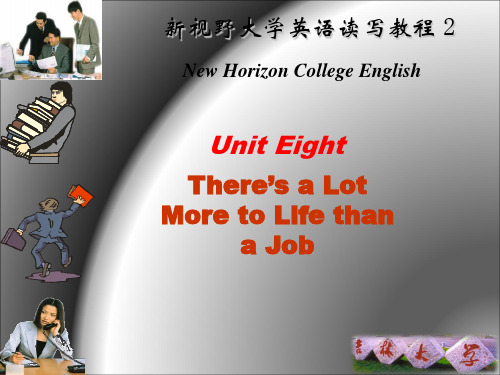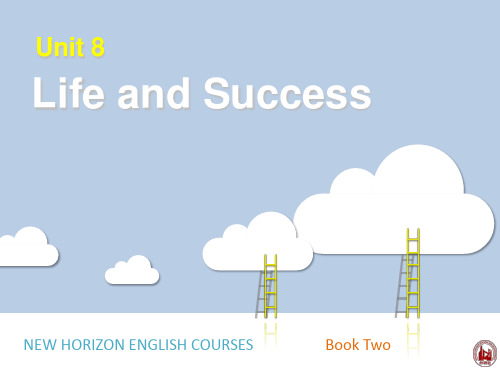新视野大学英语第三版第二册第八单元ection A课件pptppt.ppt
- 格式:ppt
- 大小:4.06 MB
- 文档页数:98




新视野三版读写B2 U8 Text AAnimals or children? — A scientist's choice1 I am the enemy! I am one of those cursed, cruel physician scientists involved in animal research. These rumors sting, for I have never thought of myself as an evil person. I became a children's doctor because of my love for children and my supreme desire to keep them healthy. During medical schooland residency, I saw many children die of cancer and bloodshed from injury —circumstances against which medicine has made great progress but stil has a long way to go. More importantly, I also saw children healthy thanks to advances in medical science such as infant breathing support, powerful new medicines and surgical techniques and the entire fieldof organ transplantation. My desire to tip the scales in favor of healthy, happy children drew me to medical research.*2M y accusers have twisted the truth into a fable and cast me asthe devil. They claim that I have no moral compass, that I torture innocent animals for the sole purpose of career advancement, and that my experiments have no relevance to medicine.Meanwhile, an uncaring public barely watches, convinced that the issue has no significance,and publicity-conscious senators and politicians increasingly give way tothe lobbying of animal rights activists.3 We, in medical research, have also been unbelievably uncaring. We haveal owed the most extreme animal rights protesters to creep in and frame the issue as one of "animal fraud" and hatred. We have persisted in our belief that a knowledgeable public would consent to the importance of animal research for public health. Perhaps we have been mistaken in not responding to the emotional tone of the argument. Perhaps we should have responded to those sad slogans and posters of animals by waving equal y sad posters of children dying of cancer or external wounds.4 In the animal rights forum, much is made of the volume of pain these animals experience in the name of medical science.Activists deny that we are trying to help and say it is evidence of our evil and cruel nature. A more reasonable argument, however, can be advanced in our defense. Life is often cruel to animals and human beings. Teenagers are flung from trucks and suffer severe head injuries. Young children barely able to walk find themselves at the bottom of swimming pools while a parent is occupied with something else. Fromeveryday germs to gang violence, no life is free of pain. Physicians hoping to relieve the eternal suffering of these tragedies have only three choices: 1) create an animal model of the problem to understand the process and test new therapies; 2) experiment on human beings (some experiments wil succeed, most wil fail); or 3) leave medical knowledge static, hoping that accidental discoveries wil lead us forward.5 Some animal rights activists would suggest an optional fourth choice,*******claiming that computer models can create a nimal experiments,thus omitting actual experiments. Computers can imitate the effects ofwel -understood principles on complex systems, as in the application of the laws of physics to airplane and automobile design. However, when the principles themselves are in question, as is the case with the complex biological systems of human life under study, computer modeling alone is of little value.6 One of the terrifying effects of arresting the use of animals in medical research is that the impact wil not be felt for years or even decades. Drugs to cure infection wil remain undiscovered, surgical and diagnostic techniques wil remain undeveloped, and fundamental biological processes that might have been understood wil remain mysteries. There is the danger that quick decisions by wel -meaning politicians wil create resolution to diplomatical y satisfy the smal minority of loud protesters while the consequences and damaging impact of those decisions wil not be apparent until long after.7 Fortunately, most of us enjoy good health, and the agony of watching one's child die has become a rare experience. Yet our good fortune should not make us unappreciative. Protection from serious sickness and drugs to combat heart *disease, high blood pressure and stroke are al based on animal research. Most complex surgical procedures such as heart or hip surgery and organ transplantation surgeries were initial y developed in animals. Techniques to replace defective genes, the cause of so much disease, as wel as the development of synthetic organs are presently undergoing animal studies. These studies, and any subsequent advances, wil effectively end if animal research is severely restricted.8 In America today, death has become an event isolated from our daily existence. As a doctor who has watched many children die and seen their parents' infinite grief, I am particularly angered by any minute expression of caring for the suffering of creatures and so little for sick and dying humanbeings. People are too protected from the reality of human life and death andwhat it means.9 Make no mistake, however. I would never advocate needless cruel treatmentof animals. The animal rights movement has made a contribution in making us more aware of animals' needs and the need to search harder for suitable alternatives. But if the more radical members of this movement are successfulin threatening further research, their efforts wil bring about a tragedy that wilcost many lives. Hence the real question is whether an uncaring majority canbe aroused to protect its future against a loud, but misdirected, minority. Language Points:1 Animals or children? — A scientist’s choice (Title)Meaning: A scientist is now facing two choices: in favor of animals or children.2 I am the enemy! I am one of those cursed, cruel physician scientists involved inanimal research. These rumors sting, for I have never thought of myself as an evilperson. (Para. 1)Meaning: I am the enemy–the one who is condemned as a cold-hearted physician scientist doing animal research. These rumors make me upset as I've never consideredmyself as being evil.Meaning beyond words: The physician’s ironic tone in the sentences well reflects hisindignation and anger at the animal rights activists.3 I became a children’s doctor because of my love for children and my supremedesire to keep them healthy. (Para. 1)Meaning: My love for children and strong desire to keep them healthy drove me to be achildren’s doctor.Usage note: supreme, superior, super, superb*supreme, superior, super, superb都是形容词,且词形相近。


新视野三版读写B2 U8 Text AAnimals or children? — A scientist's choice1 I am the enemy! I am one of those cursed, cruel physician scientists involved in animal research. These rumors sting, for I have never thought of myself as an evil person. I became a children's doctor because of my love for children and my supreme desire to keep them healthy. During medical school and residency, I saw many children die of cancer and bloodshed from injury —circumstances against which medicine has made great progress but still has a long way to go. More importantly, I also saw children healthy thanks to advances in medical science such as infant breathing support, powerful new medicines and surgical techniques and the entire field of organ transplantation. My desire to tip the scales in favor of healthy, happy children drew me to medical research.2 My accusers have twisted the truth into a fable and cast me as the devil. They claim that I have no moral compass, that I torture innocent animals for the sole purpose of career advancement, and that my experiments have no relevance to medicine.Meanwhile, an uncaring public barely watches, convinced that the issue has no significance, and publicity-conscious senators and politicians increasingly give way to the lobbying of animal rights activists.3 We, in medical research, have also been unbelievably uncaring. We have allowed the most extreme animal rights protesters to creep in and frame the issue as one of "animal fraud" and hatred. We have persisted in our belief that a knowledgeable public would consent to the importance of animal research for public health. Perhaps we have been mistaken in not responding to the emotional tone of the argument. Perhaps we should have responded to those sad slogans and posters of animals by waving equally sad posters of children dying of cancer or external wounds.4 In the animal rights forum, much is made of the volume of pain these animals experience in the name of medical science.Activists deny that we are trying to help and say it is evidence of our evil and cruel nature. A more reasonable argument, however, can be advanced in our defense. Life is often cruel to animals and human beings. Teenagers are flung from trucks and suffer severe head injuries. Young children barely able to walk find themselves at the bottom of swimming pools while a parent is occupied with something else. Fromeveryday germs to gang violence, no life is free of pain. Physicians hoping to relieve the eternal suffering of these tragedies have only three choices: 1) create an animal model of the problem to understand the process and test new therapies; 2) experiment on human beings (some experiments will succeed, most will fail); or 3) leave medical knowledge static, hoping that accidental discoveries will lead us forward.5 Some animal rights activists would suggest an optional fourth choice, claiming that computer models can create animal experiments, thus omitting actual experiments. Computers can imitate the effects of well-understood principles on complex systems, as in the application of the laws of physics to airplane and automobile design. However, when the principles themselves are in question, as is the case with the complex biological systems of human life under study, computer modeling alone is of little value.6 One of the terrifying effects of arresting the use of animals in medical research is that the impact will not be felt for years or even decades. Drugs to cure infection will remain undiscovered, surgical and diagnostic techniques will remain undeveloped, and fundamental biological processes that might have been understood will remain mysteries. There is the danger that quick decisions by well-meaning politicians will create resolution to diplomatically satisfy the small minority of loud protesters while the consequences and damaging impact of those decisions will not be apparent until long after.7 Fortunately, most of us enjoy good health, and the agony of watching one's child die has become a rare experience. Yet our good fortune should not make us unappreciative. Protection from serious sickness and drugs to combat heart disease, high blood pressure and stroke are all based on animal research. Most complex surgical procedures such as heart or hip surgery and organ transplantation surgeries were initially developed in animals. Techniques to replace defective genes, the cause of so much disease, as well as the development of synthetic organs are presently undergoing animal studies. These studies, and any subsequent advances, will effectively end if animal research is severely restricted.8 In America today, death has become an event isolated from our daily existence. Asa doctor who has watched many children die and seen their parents' infinite grief, I am particularly angered by any minute expression of caring for the suffering of creatures and so little for sick and dying humanbeings. People are too protected from the reality of human life and death and what it means.9 Make no mistake, however. I would never advocate needless cruel treatment of animals. The animal rights movement has made a contribution in making us more aware of animals' needs and the need to search harder for suitable alternatives. But if the more radical members of this movement are successful in threatening further research, their efforts will bring about a tragedy that will cost many lives. Hence the real question is whether an uncaring majority can be aroused to protect its future against a loud, but misdirected, minority.Language Points:1 Animals or children? —A scientist’s choice (Title)Meaning: A scientist is now facing two choices: in favor of animals or children.2 I am the enemy! I am one of those cursed, cruel physician scientists involved in animal research. These rumors sting, for I have never thought of myself as an evil person. (Para. 1) Meaning: I am the enemy–the one who is condemned as a cold-hearted physician scientistdoing animal research. These rumors make me upset as I've never considered myself as being evil.Meaning beyond words: The physician’s ironic tone in the sentences well reflects his indignation and anger at the animal rights activists.3 I became a children’s doctor because of my love for childre n and my supreme desire to keep them healthy. (Para. 1)Meaning: My love for children and strong desire to keep them healthy drove me to be a children’s doctor.Usage note: supreme, superior, super, superbsupreme, superior, super, superb 都是形容词,且词形相近。
Book 2 Unit 8 Human rights Vs. animal rightsUnit 8Text AAnimals or children? –A scientist’s choice动物还是孩子?一个科学家的选择(1st ---2nd class-hour)I. Pre-reading Activities:1.1 Warm-up questions (15 M)1. Look at the picture and talk about what are the advantages and disadvantages of each way of teachingand learning.2. ASK students to interview a few classmates about what kind of teaching and leaning style they preferand discuss their findings in groups.3. ASK students to debate whether a university should provide Internet access anywhere, anytime.1.2 Words & Expressions checkup (30M)Check if the students have mastered the new words, which are required to be previewed before class.1.2.1 New Words1. transplant: vt.1) 移植(器官、皮肤等)Doctors hope to transplant a donated human heart into the patient within the next few days. 医生们希望在未来几天内能给这位病人移植一颗捐献来的人类心脏。